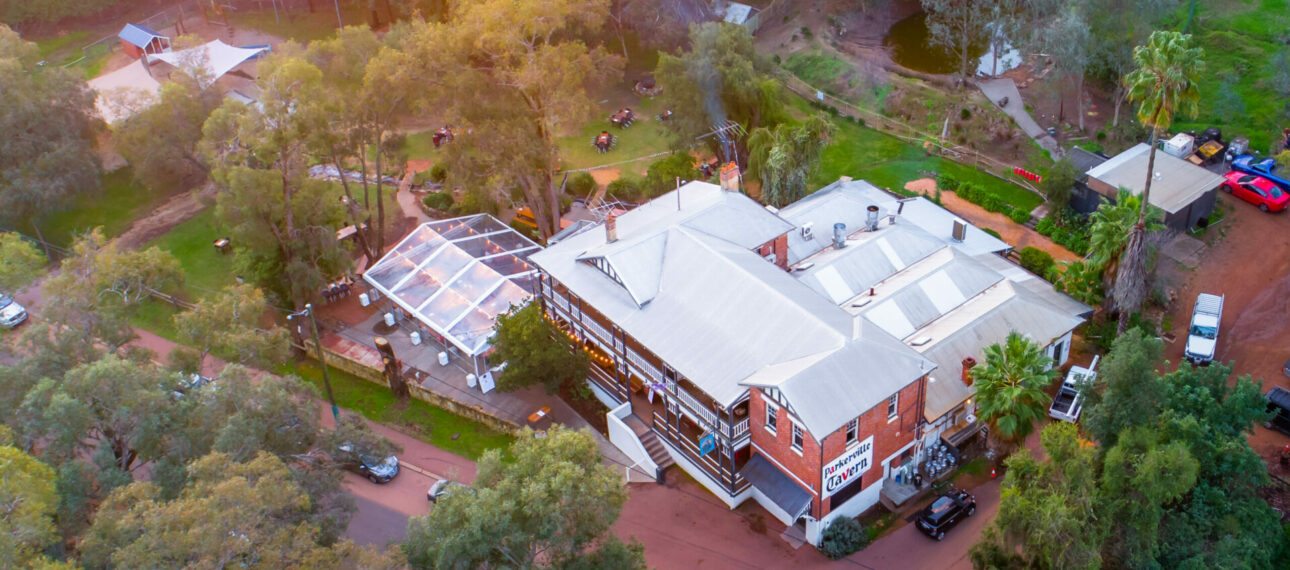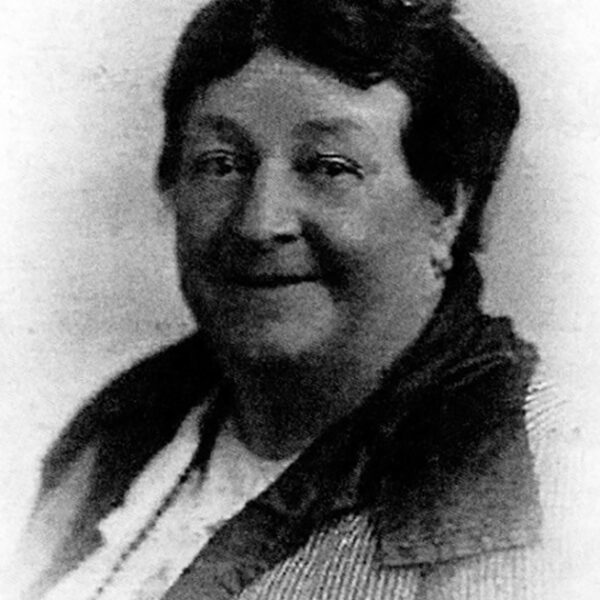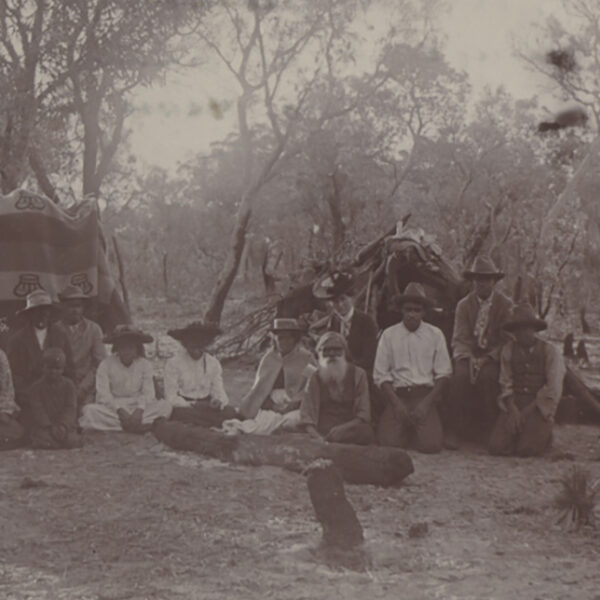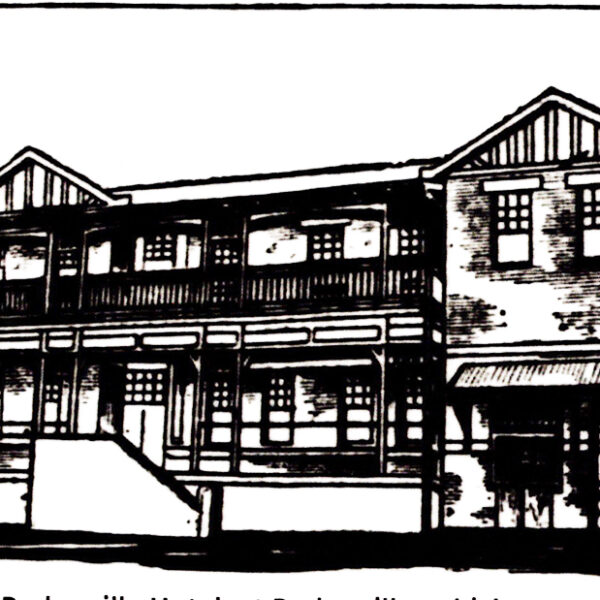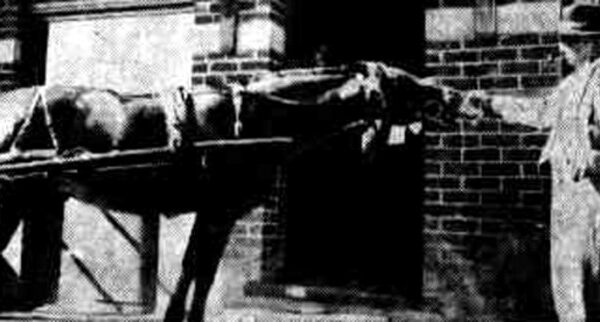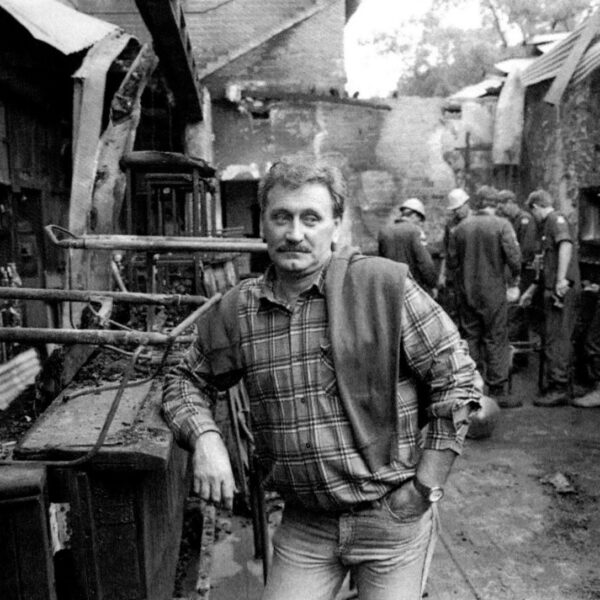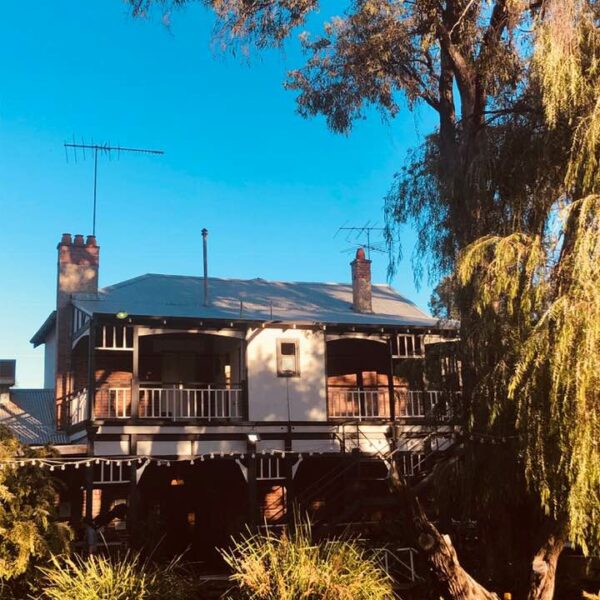Originally named ‘The Railway Hotel’, over the years The Parky has been a bottle shop, a boarding house, a hotel, and a tavern and as you would expect, it has a colourful history, including being linked to myths involving the infamous Bushranger, Moondyne Joe, the murder of Joseph Ottey by his own daughter, and having a healing mineral pool called Cleopatra’s Pool, believed to have had powers to relieve arthritis.
“The Parkerville Tavern, or ‘Parky’ as it’s affectionately known, has played a pivotal role in the Perth Hills community for over 100 years. It is a much loved and valued venue by the residents of Parkerville and surrounding suburbs.”
– T’Anne & Ryan, Licensees 2019-2024
The coming of the Eastern Railway through Parkerville and the building of the station cemented Parkerville’s status. However, the railway service was irregular. The short-lived Hills ‘gold rushes’ bought workers to the area. Many provided wood for the buildings and railways.
The original Eastern railway was opened on 11 March 1894 as a narrow-gauge section that ran from Chidlow to Guildford. It was soon learnt that the route’s steeply graded sections and sharp curves affected its operational efficiency. The solution was the creation of the 22km route via Parkerville known by some as the ‘Mahogany Creek deviation.’
Nonetheless, the train led to the establishment of the stone quarry and the transportation of both stone and harvested timber from the Darling Ranges to Perth. Between 1906 and 1925, bush railways ran between Parkerville, Mt Helena and Toodyay Road on a system owned by the Bunnings Brothers.
Charles Hebb – an early resident, complained about the Parkerville Railway inefficiency in 1900. “I purchased goods in Fremantle and waited six weeks before receiving them. They had been offloaded at Zamia on the Mundaring line and spent two weeks unattended on the station platform. It was only luck that I learnt of their whereabouts and retrieved them.”
No history of the Parkerville Tavern would be complete without reference to Joseph Ottey. Ottey came from the Western Ranges in Victoria. A bad tempered character, he was known as a hard-working timber worker who neither smoked, nor drank. Although married for 25 years, his marriage deteriorated due to regular violence and cruelty to his wife and children.
In 1896, Ottey bought Lot 72 – around 22 acres for £40 in the new land division of Parkerville. He built their timber and iron house where the Parkerville Tavern now stands. After a fierce argument in 1900, he first beat his son, then his 19 year old daughter and began to choke his wife. His daughter, Catherine then shot her father and he died the following day in Guildford. Charged with murder, she was acquitted on the grounds of self-defense after merely five minutes deliberation by the jury.
Evidence that liquor was illegally supplied to timber workers, quarrymen and labourers working and living in the Parkerville area is recorded in ‘The Inquirer and Commercial News’ of 24 June 1898. When a constable witnessed a bottle being paid for ‘in silver,’ Charles Dawson was charged with selling liquor without a licence from his store. The bench decided the contents of the bottle be ‘examined by an expert.’ Unsurprisingly, the bench’s decision is not known.
Several attempts at establishing a liquor business in Parkerville failed. In 1898, David Harvey applied for a ‘Gallon’ licence (similar to today’s ‘Bottle License’), but failed. The first application for a ‘Publican’s License’ was made in 1899, but this also failed. The reasons for both failures are unknown.
By 1910, the pub had become dilapidated. Police opposed the license renewal at the annual Licensing Court to the then licensee, Edward McNamara. They claimed the hotel was ‘well managed and clean, but the building was in a ruinous condition.’ However, the license was renewed for a year so that the owner, Alice Ottey (by then, Alice Hebb) and her husband Charles, could undertake the improvements.
During McNamara’s tenure as licensee, he was charged with being drunk while in charge of licensed premises. “It was bad enough for an ordinary man to be drunk, but it was a serious offence in a licensee,” the Magistrate ruled. McNamara was fined forty shillings.
Keeping cows was common as they provided fresh milk and cream – and the Pub was no exception. In 1914 under ‘Lost and Found’ in the ‘West Australian,’ it was reported ‘LOST from Parkerville Hotel, Sunday last, black and white cow, one horn broken. Finder rewarded.’ It is not known if the cow was found and recovered.
The era also saw the advent of competitive wood chopping amongst the axemen next to the pub which began as soon as the Sunday train arrived.
Angove left in June 1908 and the pub, although it remained owned by Alice and Charles Webb, passed through a succession of twelve licensees during the next thirteen years until Robert Congden held the license in 1921.
Then, the pub was de-licensed.
In 1927, it was rebuilt as a two-storey federation-style hotel at a cost of £7000…
“In an elevated position on seven acres, containing 16 bedrooms, large dining, commercial and smoking rooms, public and saloon bars, parlour, office, two reception rooms, three bathrooms, store room, spacious halls and large verandahs and large balconies, six lock-up garages and lavatories connected with a septic sewerage system.”
The Perth Western Mail records in March 1941, that a horse known as Tosser Bareback was a daily visitor to Parkerville Hotel. Two pots of beer were ordered for him every day. The horse became so experienced and practiced in the art of drinking from a pot, that he could lift it by himself and drain the contents without losing a drop.
On a more serious side, like many country towns throughout Australia, the male population of the Darling Ranges was decimated as many volunteered or were conscripted into military service.
After the Parkerville pub was rebuilt, the roof was painted with the word ‘PARKERVILLE’ in very large letters. To ensure that enemy aircraft could not use it as a navigation aid, the Mundaring Road Board ordered that the sign be painted out.
The Parkerville Tavern was listed on Western Australia’s Heritage Register in 2016. It has a very high aesthetic significance for the style, scale and landmark value – something which is rare in the Townsite and the Shire. It survived a fire in 1990 and underwent further restoration work.
Long-time local and regular at the tavern, Stan ‘The Mayor’ Gough, grew up in Parkerville. He remembers timber workers, chicken farms, orchardists, quarries and the railway, which was closed in 1966. He recalls that in the 1950s, Parkerville was very much a place ‘for blokes.’ This made the pub a big focal point.
It was famous for its fabulous Sunday Sessions in the 1970s, a time when pubs in the Perth metropolitan area weren’t allowed to open on Sundays. Back then, because the tavern was just outside the metropolitan area, it was widely popular as a relaxed drinking venue. Rumours suggested the premises operated as a brothel for a while, with many of the rooms upstairs being rented out by the hour.
In 2019, the Parkerville Tavern licence passed to T’Anne Mills and her partner Ryan Chandler. The Mills family has a long history with West Australian pubs. All up, T’Anne’s Grandfather, Frederick and his wife, Dorothy, managed nine hotels in WA.
Her grandparents began working at the Prince of Wales Hotel in Bunbury from 1946 until 1949. Aged just 22 at the time, Fred was the youngest bar manager in WA. Fred and Dorothy went on to manage the Wellington Hotel in Bunbury for 14 years before the Riverton Hotel in 1963. In 1964, they managed the Highway Hotel in Bunbury after which came a stint at the Bruce Rock Hotel in 1965, followed by the National Hotel in Fremantle from 1966 until 1974. They managed the Guildford Hotel for nine years until 1983, spent two years at the Quairading Hotel from 1984 and ended up at Dwellingup Hotel from 1994 through to 1995.
It was at the National Hotel that Fred created the now secret family recipe for punch. This was passed onto his son, Chris Mills who was the manager and youngest licensee in WA at the National in 1972, the Orient Hotel in Fremantle from 1972 to 1973 and the Guildford Hotel during the mid-seventies. The Mills family has been enjoying Fred’s recipe (now known as ‘Poppa’s Punch’) for over 50 years.
During a 2020 interview, Chris said the secret to managing a successful pub is employing capable and honest staff, building relationship with customers, and a sense of humour.
